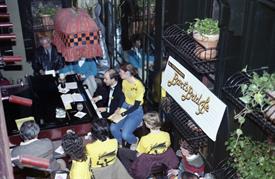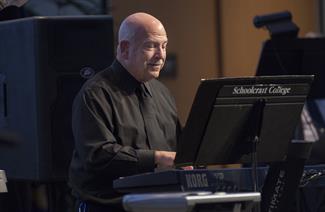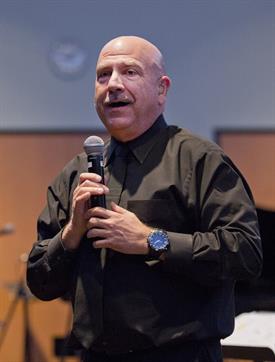It started innocently: A piano in the living room and a young boy. A rather precocious and talented young boy, as it turned out.
While the parents of Dr. Barton Polot, Chair of the Department of Music, couldn’t have absolutely known if music and their son were going to be a match, they must have had at least an inkling. After all, a piano isn’t an impulse buy.
In the end, it was a wise investment, one that enriched Polot’s life, hundreds of students at Schoolcraft College and thousands who have heard him perform or direct over the more than half-century since music became the focus of his life.
“Within a few months I had taught myself to play the theme songs to my favorite cartoon shows and had invented a way to notate them on paper,” said Polot, recounting his first foray with piano as a first-grader. “Since childhood, I’ve thought of myself as a musician.”
By third grade, for example, he was “suggesting” changes to the works of the greatest composers in history.
“I would tell my piano teacher, ‘I like this Beethoven piece, but I think it sounds better in this key,’” Polot recalled.
His sixth grade science teacher decided to test Polot’s aspirations as a composer. The rest of the class was assigned to create musical instruments out of household items. Polot’s assignment? Compose a piece for them.
“Teaching them my song was my first experience as a music educator,” he said. “Throughout my schooling I received great instruction and endless support. I spent the next 50 years paying it forward.”
The road to Schoolcraft College
Polot’s university-level music education began at the University of Michigan. Soon he was the house pianist at one of the most famous restaurants in Michigan, the Gandy Dancer in Ann Arbor, during the 1970s and 1980s.
 “I was a U of M undergraduate when I was hired to play at Chuck Muer’s train station/seafood restaurant,” Polot said. “For the people who surrounded my piano bar, it was more than music — it was a scene. I worked (played) six hours a night, six nights a week for more than 15 years, during which I completed my Bachelor’s, went on to teach in the Ann Arbor Schools, and then returned to Michigan for my Master’s and Doctorate.”
“I was a U of M undergraduate when I was hired to play at Chuck Muer’s train station/seafood restaurant,” Polot said. “For the people who surrounded my piano bar, it was more than music — it was a scene. I worked (played) six hours a night, six nights a week for more than 15 years, during which I completed my Bachelor’s, went on to teach in the Ann Arbor Schools, and then returned to Michigan for my Master’s and Doctorate.”
After teaching stints at both the University of Michigan and the University of Toledo, Polot joined the Music Department at Schoolcraft College in 2001. One thing he brought with him was a vision of how music and technology could be fused. It came after a math teacher showed him two early desktop computers connected to music keyboards: students were making music with computers.
“That was the day I saw the future,” he said. “That was the day I decided to shift my career from teaching jazz to teaching music technology.”

Within a few years, for example, Schoolcraft’s Synthesizer Ensemble became a credit course.
“For 20 years the Ensemble was my vehicle for realizing absurdly creative ways of making music with technology,” Polot said. “To the administrators who funded exotic electronic instruments, to the Media Services team that supported my ideas, and to hundreds of students who put their faith me, I extend my deepest thanks. It was a great run.”
The challenges of teaching music today
Finding new ways to teach and learn during the COVID-19 pandemic has been a challenge for teachers and students of all disciplines. For those in the performing arts, such as music, the task has been especially difficult.
“For 20 years I taught in Schoolcraft’s state-of-the-art Music Technology classroom,” Polot said, turning a bit wistful. ”My podium had dazzling instructional tools which I marshalled to capacity. The students were seated at individual workstations decked with professional-grade music hardware and software. It was a great place to teach music, to learn music, to make music. It will be again someday.”
Like others, Polot learned and adapted – sometimes not always in that order.
“Given my affinity for technology, I spent last summer exploring how Zoom could be exploited for music instruction,” he said. “This fall, I was ready. My Music Theory students see me writing on music paper via a docu-cam; notes I play on my keyboard show up on their screen in real time as an animated piano with an animated staff; my students clap rhythms at home with my Zoom flash cards; they draw notation collaboratively on the Zoom screen. There are many cool, interactive things I can do with my students that would have been impossible in the classroom.”
Even the best technology has its limitations with music, however.
“What I can’t do is bring my students together to make music,” Polot said. “Even at its best, the internet introduces latency – a delay – that wreaks havoc with rhythm. It’s a disconnected way to make music.
“When the pandemic shut down Schoolcraft’s Winter 2020 Synthesizer Ensemble mid-semester, I instructed my students to video-record their individual performances of Bach’s ‘Jesu, Joy of Man’s Desiring.’ Then I edited the videos together.”
You can view the performance online.
“Regrettably, Schoolcraft’s other music ensembles — the Wind Ensemble, Jazz Band, and Collegiate Chorale — got sent home in March, and there is still no way for them to rehearse safely,” Polot said. “Maybe September 2021. Let’s hope.”
Music teachers, students and the community also eagerly await the return of the College’s many free music performances.
“In a time when the arts are underfunded and under threat at community colleges all over the country, Schoolcraft has never wavered in its support,” Polot said. “The students, the campus and the community have responded with full houses week after week.”
 Final thoughts
Final thoughts
That’s probably because music is such a rich, visceral experience.
“Performing music and teaching music both connect me with people in deeply personal ways,” Polot said. “For me, performing is not about playing notes; it’s about engaging listeners. In the classroom, it’s not about presenting the subject material; it’s about drawing the students into the subject.”
Polot’s retirement has been in the works for five years.
“The pandemic didn’t change my end-date, but it certainly has changed my plans,” he said. “Traveling, dining and concert attendance are on hold. I plan to remain on a few music nonprofit boards. I plan to get some Chopin back in my fingers. And I plan to continue seeking the newest ways to do the oldest things.”
View Dr. Polot’s career retrospective video, “Twenty Years in Ten Minutes.”